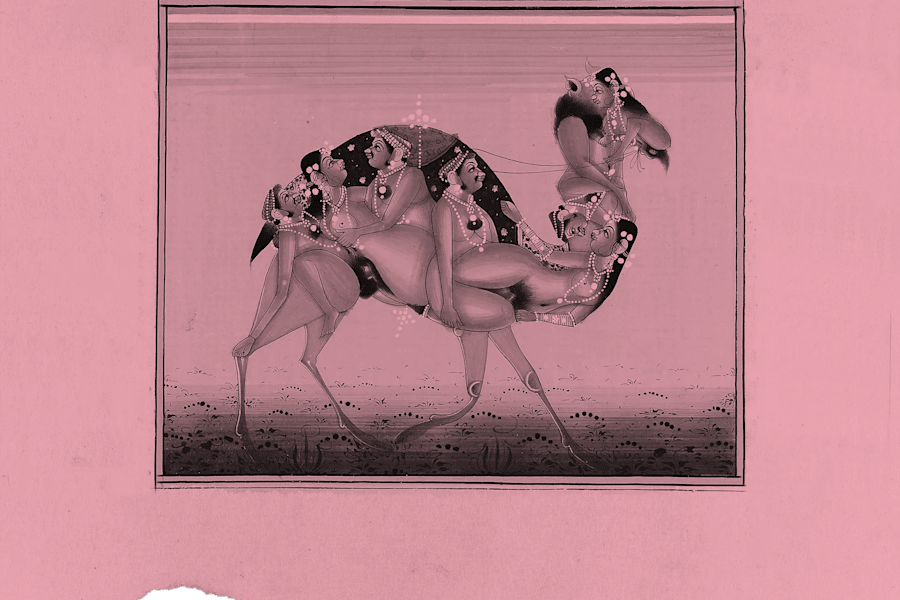
Illustrator: Serifa Studio
Where are you? And other existential questions asked of us in our youth. A short story by Lucie Elven.
After the fight, they went for dinner in a small restaurant, but the smell of the place overpowered her and in the end she had to stand outside, so when they got home her boyfriend fried an egg, and the next morning her throat was grainy. On the street, she found herself a pillar to be sick behind, walked away, then walked back to the pillar and was sick again.
The windows of the houses looked like they were framed by giant white knuckles. In the tube carriage, Marlena could sense shapes turning in the air, like the scent of jasmine in the evening. She crossed the road, down stone steps, through market arches, to the newspaper office on the edge of the bridge. At the end of the day, she brought work home, slept deeply, dreamed of women with fur pouches hanging from their waists, marching towards an exit.
On the weekend, at the beach, her boyfriend dressed her in a T-shirt with a tiger on it and striped sports socks. Took a picture of her, and she was surprised. Neither of them had brought costumes—they rouged their nipples with lipstick and lay in their underwear behind a groin.
Another weekend, in the city, he gestured at a woman they both knew, who was looking at them from the bar. This woman seemed sharper than usual, more defined. He said she and he had walked to the party together, miles and miles. Across the floor, a second girl, with an attentive expression, mouthed at Marlena, bringing her fists together and pushing them apart.
When Marlena told her boyfriend she was pregnant, he replied that it wasn’t the right time to talk and started to dance, his eyes closed, pinching the air like someone picking fruit.
Marlena applied to film school, cried in the interview as she described a shot of a horse and a swaddled man arriving at a frontier town. The professor said, “Do you realize this will be very different from”—he mimed tapping a little port glass with a silver spoon. That night, Marlena told her housemate that she was feeling more decisive; her other housemate asked her if she was feeling more decisive the next morning. She asked about Marlena’s boyfriend. Marlena said, “I wouldn’t know.” His phone had been off since the party—but he already had a horse, a dog, and a bird. Why did he need a baby?
In the cafeteria, Marlena told a colleague she was pregnant, and the colleague paused, then threw open her arms. At the clinic, when she asked to keep her scan, the nurse kissed the air disapprovingly. She said, “Why would you want to keep something that makes you cry?”
Marlena’s boyfriend reappeared that night, presenting her with merchandise from a concert he’d attended with his parents, a treat, he explained, that they’d had to delay once already when his sister had cracked open her skull. He said that he felt sorry for his parents. They never had an evening when they could relax. The t-shirt read: “I’m your man.”
*
In the morning, Marlena turned right at the end of her street, and caught the bus due south. On the waiting room screen, a presenter shouted at stock characters at rock bottom. She was called into a changing cubicle, where she put on a robe and some plastic knickers, then to the operating room, where the doctor explained about aspiration, showed her a small vacuum, and asked her to count down from ten.
“Where are you?” the anaesthesiologist asked. She told Marlena to put on her bag of clothes, then go through into a room full of tables and eat a jam sandwich that someone at the clinic had made and cut into squares. Her boyfriend came in then, and Marlena saw herself from the outside, eating the sandwich, being a patient. He stepped out to call a black cab. A nurse steadied her, helped her take off a layer of clothing, and walked with her to the doorway. It was a Victorian mansion with lawns around the drive, hidden by trees. The nurse held her arm until the taxi arrived. To thank her, Marlena asked her name.
On and on the taxi drifted, past park railings, gateposts, walnut trees, river—she closed her eyes. When they arrived at his parents’ house, her boyfriend put her to bed in the dark downstairs bedroom, and brought her rounds of buttered toast. He told her what his mum had said—in her day, it was gin and baths. They watched a cartoon about a pig who was a freelance aviator. Once, hovering over the toilet bowl, Marlena found soft purple clumps dropping out of her. “What is this?” she wanted to know, her hands covered in it, when her boyfriend pushed open the door. Another time, the light drew her up the stairs and she crept into the kitchen. A steaming machine at her elbow made her yelp, and he sprang to her side, ushering her back down the stairs again.
In the night, there was a buzz at the electric screen in the hall, someone under the bright light wanting to come in. Marlena heard the door open, her boyfriend saying, “It hadn’t crossed my mind.” A woman’s voice was telling him that she was under the impression he was scared of her. When he denied it again, the woman said, “Maybe I got the wrong end of the stick.” There was a silence, then Marlena heard her boyfriend say that he said he was always happy to see the woman, always liked hearing from her. When he came back into the bedroom, he looked like he was about to shudder, but instead took on an air of fascination.
*
“How was your break?” an editor at the newspaper said, slyly. He asked her if she had written her review just now at lunch.
Over the days that followed, she would feel herself twist open sitting in the tube or walking past a gated square. She met someone else, who spent one long night drinking gin and mango juice with her, smoking on top of a bay window.
The breakup was easy—it felt a little charmed. “We’re kids,” Marlena said. The boyfriend set her up on the bunk beds in his parents’ house and, the next morning, suggested they give each other feedback. She said she didn’t have any. He said she should be more verbal. She left early, when the sun was muddling the air, making the edges of the trees blur. He blurred too, a gray face looking out from his parents’ home, then faded.
An hour later, Marlena’s sister told her to shave her legs before her date. It was sunset when Marlena came back with the new guy to return her sister’s gold bikini. The sister was drinking in the garden where she couldn’t hear the knocking at the door. When Marlena turned, the guy was standing on the wall, singing a song. He dropped his hip, stamped his foot. She watched how he carried himself, whether he was dancing for her or for some idea of who he was, who he would be tomorrow. He sat on the wall and told her a story about a plane that sailed up, up—then he trailed off and let it crash down again. He kept flicking his lighter. She couldn’t imagine regretting it. They waited to be let in.


